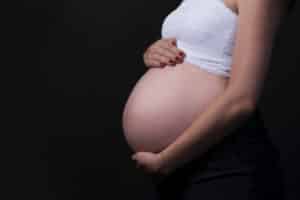Did you read What are the Signs of a Listeria Infection?
Frequently, a listeriosis diagnosis for a pregnant woman will be made through a blood test. By testing the sample, the health professional will see if the listeria bacteria is present or no.
The can also do a lumbar puncture to test the cerebrospinal fluid, or take vaginal samples.
For a baby, they might examine the liquid in their stomach to detect if they were infected in utero.
Transmitting Listeria from Mother to Baby

Listeriosis Infection Risks
For the pregnant woman:
Beyond potential symptoms, pregnant women will rarely face complicated situations. But if the infection took place during the first trimester, the listeria infection may lead to miscarriages. There is also a risk of premature delivery later in the pregnancy.
For the baby:
If the baby is infected, their brain (meningitis) or blood may become infected, which can lead to severe complications or death.


